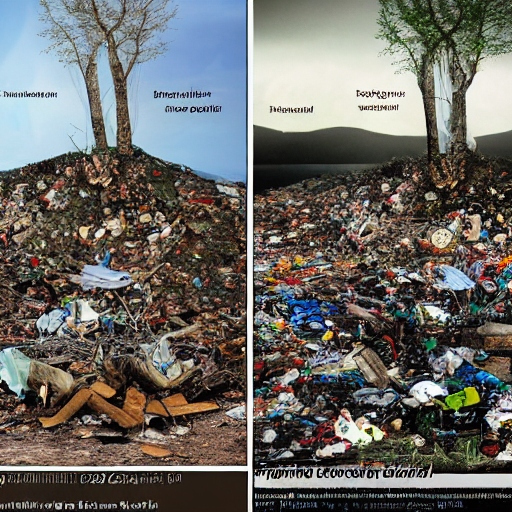Minimalism is not merely about having fewer possessions; it’s a philosophy that challenges us to redefine what truly adds value to our lives. By embracing minimalism, we strip away the excess, leaving behind only what brings us genuine joy and purpose. It prompts us to ask ourselves tough questions about consumption and materialism, urging us to prioritize experiences over possessions and to cultivate a deeper appreciation for the simplicity of life.
Sustainability isn’t just a buzzword; it’s a fundamental principle that acknowledges our responsibility to preserve and protect the delicate balance of our planet’s ecosystems for future generations. It requires us to make mindful choices that minimize our negative impact on the environment while meeting the needs of the present. Sustainable practices encompass everything from renewable energy sources to ethical consumption habits, reminding us that our actions today shape the world of tomorrow.
Zero Waste challenges us to rethink our throwaway culture and adopt a more circular approach to resource management. It encourages us to minimize waste generation by reducing, reusing, and recycling materials wherever possible. By embracing the zero waste mindset, we strive to send nothing to landfill, recognizing that every item has value and potential for reuse or repurposing.
Conscious Consumerism empowers us to vote with our wallets, supporting businesses and products aligned with our values of ethics, sustainability, and social responsibility. It prompts us to critically evaluate the environmental and social implications of our purchases, recognizing that every buying decision has far-reaching consequences. By becoming conscious consumers, we wield our purchasing power to drive positive change in industries and communities around the globe.
Destructive Consumerism epitomizes the dark side of our materialistic culture, characterized by overconsumption, waste, and disregard for the consequences of our actions. It fuels a relentless cycle of production and consumption that depletes natural resources, pollutes the environment, and perpetuates social inequalities. Destructive consumerism blinds us to the true cost of our lifestyles, leading to ecological devastation and social unrest.
Carbon Footprints measures the total amount of greenhouse gases emitted directly or indirectly by individuals, organizations, or products, quantifying their impact on climate change. It serves as a crucial metric for assessing environmental sustainability and guiding efforts to reduce emissions. By understanding and minimizing our carbon footprint, we take proactive steps towards mitigating climate change and safeguarding the health of our planet for future generations.
Organization isn’t just about neatness and tidiness; it’s about creating systems and structures that enhance efficiency, productivity, and peace of mind. Whether it’s decluttering our physical spaces or streamlining our digital workflows, organization empowers us to focus our time and energy on what truly matters, freeing us from the chaos of disorganization and enabling us to pursue our goals with clarity and purpose.
Living Clutter-free isn’t merely about having a tidy home; it’s about fostering a sense of calm, clarity, and freedom by consciously curating our surroundings. By letting go of excess possessions and unnecessary distractions, we create space for what truly brings us joy and fulfillment. Embracing a clutter-free lifestyle allows us to reclaim our time, energy, and attention, enabling us to live more intentionally and authentically.
Waste-free Living challenges us to rethink our consumption habits and strive for a more sustainable relationship with resources. It involves reducing our reliance on single-use products, opting for reusable alternatives, and minimizing waste generation at every stage of the product lifecycle. By embracing waste-free practices, we not only lighten our environmental footprint but also foster a deeper connection to the natural world and the resources it provides.
Pollution-free Environments are essential for safeguarding human health, biodiversity, and ecosystem integrity. They entail reducing emissions of pollutants such as greenhouse gases, particulate matter, and toxic chemicals, thereby mitigating their adverse impacts on air, water, and soil quality. Achieving pollution-free environments requires collective action and innovative solutions that prioritize environmental protection and public health.
Healthy Soil forms the foundation of sustainable agriculture and ecosystem resilience, supporting plant growth, nutrient cycling, and water retention. It teems with life, from microorganisms to earthworms, that play critical roles in soil fertility and ecosystem function. Investing in healthy soil management practices such as cover cropping, crop rotation, and composting is essential for maintaining soil health and productivity for future generations.
Clean Air is essential for human health and well-being, yet millions of people worldwide are exposed to polluted air that poses serious risks to respiratory and cardiovascular health. Achieving clean air requires concerted efforts to reduce emissions from transportation, industry, and energy production, as well as promoting cleaner technologies and sustainable urban planning. By prioritizing clean air initiatives, we can protect public health, mitigate climate change, and create healthier, more livable communities.
Recycling is a cornerstone of waste management and resource conservation, offering a sustainable solution to diverting materials from landfill and reducing the extraction of virgin resources. It involves collecting, processing, and remanufacturing materials such as paper, glass, plastic, and metal into new products. By closing the loop through recycling, we conserve energy, reduce pollution, and conserve natural resources, contributing to a more circular economy.
Giveaways offer an opportunity to declutter our homes and share our abundance with others, fostering a sense of generosity, community, and gratitude. Whether it’s donating gently used items to charity, hosting a clothing swap, or participating in a neighborhood sharing initiative, giveaways enable us to extend the lifespan of goods, reduce waste, and support those in need. Embracing the spirit of giving not only enriches the lives of others but also brings us joy and fulfillment in knowing that we’ve made a positive difference in the world
